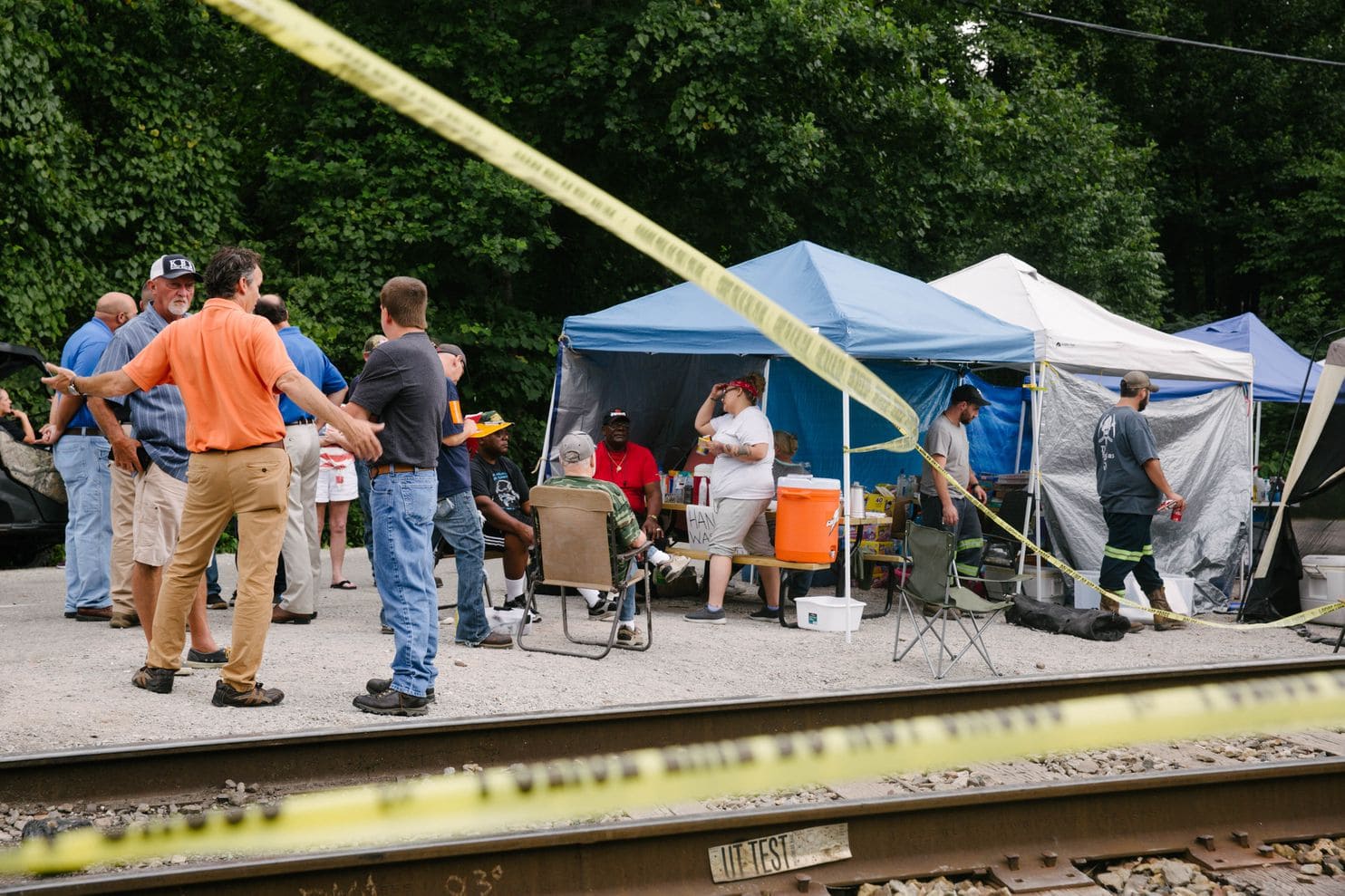In Trump Country, a Group of Coal Miners Rebel Over Lost Jobs, Missed Paychecks

By Tim Craig
September 2, 2019 - Sitting in lawn chairs plopped in the middle of train tracks, two coal miners smoked and chewed tobacco to pass the time. There’s been little else to do here for the past four weeks, except wave at motorists who honk in support of these homegrown heroes waging a national struggle over workers’ rights.
Since Chris Rowe and Chris Sexton were laid off from their mining jobs this summer along with 300 co-workers, they have been camped out here in the mountains of eastern Kentucky, blocking a train car full of coal from going to market. Their protest is against coal company Blackjewel, which halted operations in July without settling its final salary obligations to Rowe, Sexton and an estimated 1,800 other workers across the country. But it’s also become a declaration against corporate bankruptcy laws that they say deprioritize workers’ interests.
“The same situation may have happened to others, but we are the ones making a stand,” said Rowe, 35, who was laid off days after he purchased his first house. “We mined the coal and broke our backs to get that coal, so that coal belongs to us until they pay for it.”
Blackjewel is part of the latest spate of coal producers to file for bankruptcy, a trend that has lingered under President Trump as the nation’s appetite for coal has continued to shrink. The Trump administration’s rollback of environmental regulations implemented under Obama have failed to spark a revival in communities like Cumberland that formed his political base during the 2016 election.
Cumberland is located in Harlan County, where Trump won 85 percent of the vote. But these miners say their fight isn’t a political one. At the camp, there is an informal policy against speaking about Trump or partisan issues, underscoring the president’s continued popularity in areas where the local economy has continued to suffer.
“That is the main reason we have gotten as far as we’ve got now; it’s because we have kept the nonsense down,” Rowe said, referring to the nation’s divisive political debate.
.jpg)
Miners stand on train tracks in Cumberland, Ky., on Aug. 2. The miners have been working in shifts to block railroad tracks leading to a Blackjewel mine. They're demanding back pay for work done in weeks leading up to the company’s bankruptcy, after checks issued by Blackjewel bounced or never arrived.
Photo by Meg Roussos, Bloomberg
Although the number of Americans employed in the coal industry nationwide has remained relatively steady since Trump took office, analysts say the industry faces a rocky future as energy suppliers continue to shift toward renewable sources and relatively low-cost natural gas. Annual U.S. coal production is expected to drop from 711 million tons to less than 600 million tons during the next five years, said Gregory Marmon, a principal coal analyst at global consulting firm Wood Mackenzie.
“The administration has definitely pulled back regulations, and that has stopped some of the bleeding, but renewable energy is so cost-effective, and natural gas prices are so low, the pulling back of some regulations has not been able to stop the decline of coal,” Marmon said.
Blackjewel, which operated mines in Kentucky, Virginia, West Virginia and Wyoming, abruptly announced July 1 that it was shutting down operations. Paychecks bounced or were clawed out of miners’ accounts. Other paychecks were never issued.
“We had just bought a washer, and then the bank pulled the money back out, and it made our account negative,” said Stacy Rowe, Chris Rowe’s wife.
The effect of those missed paychecks has rippled through the county’s economy. Many of the miners made $20 to $30 an hour, a middle-class salary in a county where the household median income is $24,000 a year, according to the U.S. Census Bureau.
Upset that the product of his labor was about to leave town while his bank account showed a negative balance of $2,100, Sexton phoned Rowe and other miners to stop the coal train on July 29, an act of defiance that continues today.
After a tense standoff with Kentucky State Police troopers, the rail cars remained stationary and the miners were permitted to continue their protest. The workers have erected blue and white tarps along the rail tracks to create a makeshift kitchen, children’s playroom, and a space to collect donated clothes and canned goods. Portable toilets have been trucked in. Each night, miners pitch tents or sleep in their trucks to avoid the coyotes and black bears that pass these rail tracks parallel to a tributary of the Cumberland River named “Poor Fork.”
“If that train leaves, we ain’t got nothing,” said Sexton, 30, who said Blackjewel owes him about $5,000. “This is all we got left, because we mined it and still ain’t got paid for it.”

Supporters of miners sit near train tracks in Cumberland, Ky., on Aug. 2.
Photo by Meg Roussos, Bloomberg
The Labor Department has sought an injunction to prevent Blackjewel from moving the rail car, which is estimated to have about $1 million in coal, according to local media reports.
Meanwhile, a team of attorneys is working to help the miners, who were not unionized, to secure back pay and other damages as part of bankruptcy proceedings. Sam Petsonk, a West Virginia attorney who is representing 1,100 of the laid-off employees, said the miners’ plight highlights the need to reform bankruptcy laws so employee wages and benefits are more highly prioritized in such legal proceedings.
Blackjewel is selling off mines as part of the bankruptcy proceedings and, in at least one case, “the buyer has committed to assume and pay outstanding employee obligations,” according to a statement from interim CEO David Beckman.
The previous chief executive, Jeffrey Hoops Sr., resigned on July 3.
“Blackjewel knows that each day that passes creates additional hardship for miners who have not yet been brought back to work and their families,” Beckman said. The company “continues to work tirelessly on finding ways to make all of the employees whole on their pre-petition wages.”
The protest has brought attention to the decline of labor unions across coal country, particularly in Harlan County, site of a violent uprising in the 1930s by coal miners who attempted to form a union. As mines shut down in recent decades, amid declining reserves and more stringent environmental regulations, they have been replaced with smaller, less labor-intensive operations that relied on nonunionized workers.
Now, there are no unionized coal mines in Kentucky, according to Phil Smith, the director of communications and government affairs for the United Mine Workers of America. Nationwide, just about a quarter of the nation’s 38,000 hourly coal miners are represented by the United Mine Workers, Smith added.
“These workers are showing how all workers are vulnerable to the efforts of corporations to deny them wages and benefits, but you can come together as a group and challenge it,” said William J. Londrigan, president of the Kentucky AFL-CIO.
The fight has attracted national attention. Farmer Wayne Cryts drove 12 hours from Missouri to show support for the coal workers’ cause.
While visiting the camp last week, he told Sexton and Rowe that he made national headlines in the early 1980s when he nearly lost 31,000 bushels of soybeans after the company that stored it declared bankruptcy. With his crop tied up in court proceedings, Cryts and dozens of supporters tried to force their way into the grain elevator to retrieve his harvest. The move triggered a protracted legal battle that eventually landed Cryts in prison.
“I can tell you from experience, that coal is the only leverage you got,” said Cryts, who vowed to return if authorities try to forcibly break up the camp.
Meanwhile, all around them, storefronts are boarded up and signs advertising payday loans are affixed to power poles. Some Cumberland residents say their faith in the U.S. political system is being tested.
“It just feels like we are still waiting” for Trump’s vow to revive the economies of depressed communities, said Boe Montgomery, 59. “This town is just about done in, and they might as well just make it a lake.”
But Dan Mosley, the county executive, said the overall health of Harlan County’s economy had been on an upswing in recent years before the Blackjewel bankruptcy. The county had a 13 percent unemployment rate in January 2017, when Trump was sworn into office, but it had fallen to about 7 percent, according to the Bureau of Labor Statistics. The unemployment rate surged back to 13 percent in July, according to the Federal Reserve Bank of St. Louis.
The closure of the Blackjewel mines shouldn’t be viewed as “an issue that affects the president in any way,” Mosley said.
“This is an issue of one failed company, and one failed executive who didn’t manage his company the right way,” said Mosley, a Democrat, who added the region also needs to continue diversifying its economy.
As he sat in the protest camp last week, holding his 9-month-old daughter, 29-year-old David Pratt said being laid off made him decide to go to college to get his nursing degree.
“I just started last Monday and decided to do it while I’m still young enough,” said Pratt, noting he’s now been laid off three times from three different coal companies over the past 11 years.
But many of the miners say they remain optimistic they will soon be able to return to work after Blackjewel’s Kentucky assets are sold off to a new owner.
If that happens, though, the miners believe their protest will have sent a powerful message to their new boss as well.
“Coal will make a comeback, maybe not a big comeback, but it will come back,” Rowe said. “And hopefully these companies will see guys are going to start standing up again.”

